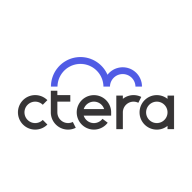

Find out in this report how the two Cloud Storage solutions compare in terms of features, pricing, service and support, easy of deployment, and ROI.
As a cloud storage option, it is flexible and cost-effective, eliminating the need for a permanent investment in hard disks.
Adding SSD storage to Windows file servers is expensive, and we no longer need to back up those devices.
I am positive that CTERA has helped reduce the total cost of ownership by eliminating the need for manual storage management and reducing storage service processes.
Enterprise support provides access to AWS developers 24/7.
They provide instant and chat support, addressing concerns in a timely manner.
Once subscribed, the support team is very responsive, connecting remotely to assist with troubleshooting.
They swiftly address concerns and take ownership of the call, providing a very satisfactory support experience.
High-priority issues are handled promptly.
I would rate their support a ten out of ten.
Amazon EBS is easy to scale up or down as needed.
Vertical scaling can be achieved by adding additional volumes whenever the created storage is insufficient.
All cloud solutions permit scalability, and this is an important feature.
If we need to upgrade CPU and memory, we should be able to do that without a license upgrade.
CTERA is a very scalable product, allowing us to grow.
It offers good scalability options, including vertical and outward scalability.
AWS provides infrastructure stability like data centers, ensuring high stability.
I have never had problems with its stability.
If the server is stable, then EBS is stable.
It has been pretty stable since then.
We had things deployed for years, and we were suddenly getting cloud sync issues that were crashing our sites.
It is very stable and reliable.
Regarding EBS, if an instance is terminated, the volume is also deleted, which leads to data loss.
I would like EBS to have no limitations, similar to stream-like block storage, which can accommodate an unlimited amount of sales.
Deployment is not easy as it requires server downtime to map newly created volumes, impacting operations during additional volume additions.
AI and automation features could enhance the platform, such as AI-powered search, predictive storage analytics, and intelligent alerts for proactive monitoring.
It would help to have a global single-pane-of-glass view of all my CTERA devices.
One suggested improvement for the CTERA Enterprise File Services Platform is the ability to distribute data across multiple active backend storage nodes rather than the current limitation of a single active node.
For SSD IOPS, you only pay $0.125 per gigabyte.
The pay-for-what-you-use model justifies the amount paid, with no extra or hidden charges.
Users are charged only for the data used, not for the allocated volume.
Unlike other solutions that require hardware purchases, CTERA offers software licensing with flexibility across multiple infrastructure providers.
CTERA's pricing seems to be on par with some of the other players, such as Nasuni and Azure.
I find the pricing reasonable.
Amazon EBS is also scalable and provides high availability.
EBS provides vertical scaling options to add additional volumes when more storage is required.
Amazon EBS allows seamless changes to the instance type without affecting application availability.
As soon as something is written to the device, CTERA copies it to the cloud, where it's versioned with snapshots so we can recover it.
A vital advantage of this platform is its instantaneous recovery capability, allowing seamless access to a secondary gateway if the primary one fails.
It is a three-in-one solution for us. It is a file-sharing platform, an archiving solution, and also a backup solution.


Amazon Elastic Block Store (Amazon EBS) provides persistent block level storage volumes for use with Amazon EC2 instances in the AWS Cloud. Each Amazon EBS volume is automatically replicated within its Availability Zone to protect you from component failure, offering high availability and durability. Amazon EBS volumes offer the consistent and low-latency performance needed to run your workloads. With Amazon EBS, you can scale your usage up or down within minutes – all while paying a low price for only what you provision.
The CTERA Enterprise File Services Platform provides a cloud-native global file system over public and private object storage, revolutionizing the world of hybrid cloud data solutions. Enhanced by a rich data services ecosystem, CTERA enables enterprises to gain full control of their data for optimal edge performance, data insight, and governance. The platform focuses on security, providing features like data encryption, access controls, and ransomware protection. Centralized management tools enable efficient data control and monitoring. The platform is being used to replace legacy NAS and file servers, especially at remote locations, and simplify backup and disaster recovery of file data while providing the flexibility of multi-cloud deployments with infinite scalability. CTERA is at the core of hybrid cloud transformations of some of the world’s largest banks, healthcare organizations, global media groups, and government agencies, in deployments that scale to tens of petabytes.
We monitor all Cloud Storage reviews to prevent fraudulent reviews and keep review quality high. We do not post reviews by company employees or direct competitors. We validate each review for authenticity via cross-reference with LinkedIn, and personal follow-up with the reviewer when necessary.